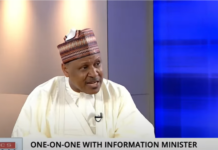
KEYNOTE ADDRESS BY HON. MINISTER OF INFORMATION AND NATIONAL ORIENTATION, ALHAJI MOHAMMED IDRIS MALAGI fnipr, DURING THE ANNUAL POLICE PROs CONFERENCE, UYO, ON DECEMBER 11, 2023
Protocol
I am honoured to attend this conference of not just refined police officers but also professional public relations practitioners, in whose hands the image of our nation’s Police rests.
I must commend the Nigeria Police Force under the leadership of the Inspector-General of Police, Mr. Kayode Egbetokun, for organizing this event, which aims to keep officers abreast of the realities in this ever-dynamic profession. This is not unexpected because, at the onset of his appointment, the Inspector-General of Police had charged officers to prioritize adherence to the principles of fairness, professionalism, and respect for human rights.
The theme of this conference, Enhanced Strategic Communication as the Panacea for Effective Policing and Peaceful Coexistence in Nigeria, clearly situates the role that communication plays in securing a nation as diverse and dynamic as ours. It is the bridge that connects us, the compass that guides us, and the key to unlocking the full potential of a secure and harmonious society.
In recent times, Nigeria has faced myriad challenges, ranging from security concerns to social tensions. The role of law enforcement in maintaining peace and order is undeniably crucial. Still, the effectiveness of their efforts is intricately tied to how well they communicate with the communities they serve. Strategic communication is not a luxury but a necessity, especially in a vast and varied nation like ours.
Communication is more than just the exchange of words; it is the foundation upon which trust is built and understanding flourishes. Enhanced strategic communication empowers law enforcement to forge meaningful connections with the communities they protect. It is a two-way street that fosters transparency, accountability, and collaboration. When citizens are informed and their concerns are acknowledged, the foundation for peaceful coexistence is laid.
Your Excellencies, distinguished officers, we cannot ignore the challenges that exist; misinformation, cultural nuances, and rapid change in our society demand that law enforcement agencies adapt and refine their communication strategies. In the face of these challenges lies an opportunity for innovation, leveraging technology and embracing a multi-dimensional approach to communication.
Every day, in every state of our country, police officers prevent crime, solve cases, make arrests, and remove rotten eggs from their ranks. This will make it more possible for the government to fulfil its obligation of securing citizens. Beyond reporting these great efforts adequately, the police must spend more on perception management and rebranding. You have ready allies in the broadcast and print media and have great opportunities with opinion leaders, organized groups, and communities.
In the 21st century, technology has emerged as a powerful ally in the quest for effective policing. Social media, mobile applications, and other digital platforms provide avenues for real-time engagement and dissemination of information. Law enforcement agencies must harness these tools to convey messages and listen actively, gaining insights into the needs and concerns of the communities.
Trust is the cornerstone of effective policing. Enhanced strategic communication is a vehicle for building and reinforcing that trust. Dialogue between law enforcement and citizens must be ongoing and meaningful. Town hall meetings, community forums, and other interactive platforms should be embraced to ensure that the voices of the people are heard and their perspectives are considered in the decision-making processes.
To navigate the complexities of modern communication, our law enforcement agencies must invest in training and capacity building. Equipping officers with the skills to engage with diverse communities, handle sensitive information, and utilize technology responsibly is paramount. A well-informed and communicatively competent force is better positioned to serve and protect. I believe every PRO here is a member of the Nigeria Institute of Public Relations; if not, I advise you to be.
We must remember that President Bola Ahmed Tinubu has tasked us to be better citizens, and as public officers, we must abide by the code of conduct. Our actions have repercussions not just for the image of the police but for our government and our nation.
The President is set to launch the National Values Charter, which will establish a social contract between the citizens and the country. This document will provide a blueprint and policy for a national value system that will define us as Nigerians, both as citizens and public officers, and will underpin our identity and personality. I hope that the Nigeria Police will be quick to embrace this Charter.
In conclusion, the path to effective policing and peaceful coexistence in Nigeria lies in our commitment to enhanced strategic communication. It is not merely a tool but a philosophy that should permeate every aspect of law enforcement. As we embark on this journey, let us remember that in unity and understanding, we find strength. Let us build a Nigeria where communication catalyses security, justice, and lasting harmony.
Thank you for listening.




